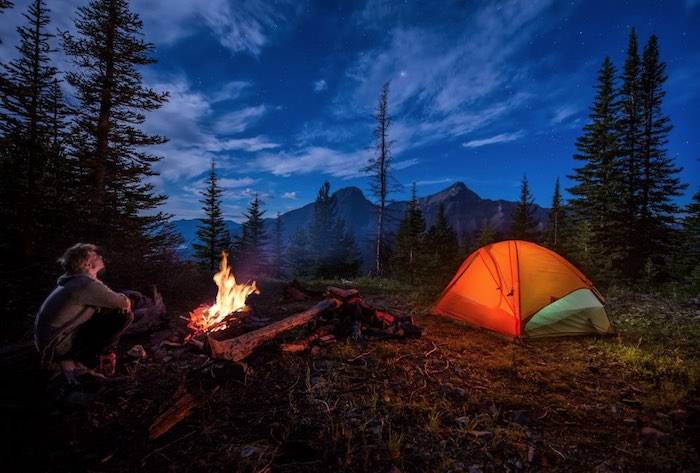Also Interesting
A Guide To Going On An Off-The-Grid Adventure

With our lives becoming increasingly connected online, it’s unsurprising to want to go off the grid for a few days. After all, having the opportunity to separate oneself from constant stimulation is a kind of freedom that’s needed yet difficult to come by. However, simply getting up and deciding to live off-grid from now on is probably too much for some, so the next best option is to go off-the-grid adventuring.
Some assume that living in extreme conditions in the most remote places in the world is what it takes to have an off-the-grid adventure. But having your first off-the-grid adventure by removing all the conveniences of modern technology might put you off from having another trip in the future.
Thus, it’s best to introduce yourself to this type of adventure by removing the technology you can live without. For example, you can take away your access to the internet and Wi-Fi, but it’s probably unrealistic to remove yourself from access to power and water. An off-the-grid trip can be a great way to have an active weekend as you spend more time outdoors and away from your phone.
Here are ways to ensure your adventure goes without a hitch:

1. Pick A Place
The destination you’ve chosen mostly determines how your trip will turn out. Even though you’re going off-grid, it’s best to know all the relevant details of your destination. For example, you may have fees to pay with the National Park Service and certain regulations to follow. It’s also advisable to be familiar with the nature and wildlife in the area to keep yourself safe.
Experienced adventurers know that nature doesn’t pick its victims—and with good reason, considering how merciless the wildlife is to anyone who foolishly stumbles into its territory. But be that as it may, fending the wildlife by inflicting harm isn’t wise, especially if laws protect that species.
Thus, you must research the place you’ve been eying. See if it can accommodate a traveler and provide enough resources for your trip. After all, choosing a portable power station requires knowledge of roughly how much energy you’ll need. This is so you won’t run out of power in the middle of your adventure, saving yourself from inconvenience.
2. Practice Sustainability
Considering you’re surrounded by nature, one way to enjoy your adventure is by utilizing your environment to the fullest, whether it’s the trees or sunlight. They’re your best alternatives for energy sources if you want your trip to last longer without relying too much on your portable power station. You can also practice survival tricks such as building a campfire and using tools like a torch or a rope.
3. Conserve Supplies
As refreshing as it is to pull away from modern life, it removes the conveniences you’re normally used to. Since you only depend on your resources to survive, you must learn how to conserve them.
Be mindful of your power resources. Estimate how much you can use throughout your trip before you deplete them. As for the rest of your supplies, always update your inventory after using them. That way, you can keep better track of them and have a rough timeline of how long they’ll last before you decide it’s time to go home.
4. Be Prepared
Going off the grid with little to no plans over what you’re supposed to do is already a disaster in the making. Inexperienced travelers are unlikely to last long when going off the grid—much less enjoy it. Your off-the-grid adventure should give you solitude away from your busy life, so it’s essential that everything must be prepared to avoid frustration.
Once you’ve found your destination, check it thoroughly. On top of regulations, find out what awaits you at your destination. Learn the best route to get there and see what the path has in store for you, whether they’re mountain ranges or bodies of water. It’s good to study navigation to have an easier time traveling.
While you may have diligently followed the weather forecast before leaving, the weather can still be unpredictable. Instead of only sticking to one kind of gear, it’s better to pack different clothes for various weather conditions, whether for hot days or rainstorms. Ensure that most of what you’re wearing is moisture-wicking to avoid dealing with wet clothes.
Since there’s no way of telling what might happen to you on your trip, prepare survival tools for various scenarios. Have bug spray to avoid being bitten by pests. Bringing bear spray is also a good idea if you’ll be in a place where bears inhabit. Lastly, keep a complete first-aid kit on hand in case of injuries or accidents.
5. Start Slow
Even though you poured days into planning your off-the-grid adventure, it’s still overwhelming once you get into the thick of it. Mistakes are bound to happen on your first trip. Know your limits and only take a short trip for your first time, ideally around a day or two. Use this opportunity to get your feet wet on off-the-grid adventures. Your first experience should give you a better idea of what to do and learn for your next trip. If you encounter any mistakes on your first trip, know that these will only build your skills for future adventures.
Takeaway
It’s easy to get caught up in everything that’s happening around you. After all, keeping up with all your responsibilities is no easy feat. Thus, it’s understandable why you’d like to take an off-the-grid adventure.
As compelling as it is to take a spontaneous adventure, it’s vital to have everything prepared to avoid frustration during your trip. Remember, your off-the-grid adventure should allow you to relax and de-stress.
Also Interesting
Losing as Strategy: How Pusoy Dos on GameZone Builds Tactical Skill

Winning has always been the shiny prize everyone chases—but any seasoned Pusoy Dos player knows that real mastery begins where the losing streak starts.
Behind every card drawn, every failed bluff, and every quiet defeat lies the blueprint of strategy itself.
In online Pusoy Dos, especially on GameZone, the concept of losing transforms from a simple setback into a calculated part of learning. It’s no longer just about who gets rid of their cards first; it’s about who can read the rhythm of the game, adapt quickly, and control the mental battlefield.
If you’ve ever thought losing was the opposite of winning, GameZone’s version of online Pusoy Dos might just convince you otherwise—it’s the training ground where every loss becomes a weapon.
The Strategic Framework of Losing
In traditional Pusoy Dos, luck and skill intertwine in every hand. Players learn to form melds, adjust their tempo, and predict opponents’ moves. But what truly defines success isn’t how often you win—it’s how well you respond to loss.
Every defeat forces recalibration. You learn to dissect what went wrong: Did you reveal your strong cards too early? Did you fail to anticipate a counter? Did your timing falter under pressure?
Losing gives you data, and data drives better decisions.
That’s why elite players on GameZone treat each loss like a post-match analysis session. It’s not about pride—it’s about pattern recognition. The sooner you embrace losing as a diagnostic tool, the faster your strategy evolves.
Tactical Patience: The Skill Behind the Calm
In online Pusoy Dos, patience isn’t passive—it’s tactical. When the game speeds up and pressure mounts, impulsive moves often spell disaster. The disciplined player, however, uses restraint as a strategic weapon.
GameZone’s competitive setup reinforces this mindset. The players who dominate over time are those who maintain composure, waiting for key openings rather than rushing to play their strongest hand.
This principle mirrors real-world strategic thinking: the concept of calculated delay. In war, business, or gaming, the most successful tacticians act when their timing aligns with maximum impact—not when emotions demand immediate action.
In this light, losing becomes less about failure and more about timing refinement. Each loss fine-tunes your sense of rhythm until you can read the invisible tempo of the table.
From Reaction to Anticipation: The Psychology of Strategic Loss
Every round of Pusoy Dos is an exercise in human psychology. Behind every card lies a decision driven by confidence, anxiety, or misdirection. Losing helps sharpen your ability to read these emotional undercurrents.
The more you lose, the more data you gather about how people behave under pressure.
You begin to see patterns: the players who panic after a few bad turns, the overconfident ones who burn their best cards too early, and the cautious types who never strike when they should.
By studying defeat, you build anticipation—a skill far more valuable than raw luck. On GameZone, this translates into superior adaptability.
You stop reacting to what happens and start predicting what’s about to happen. That’s where strategy stops being reactive and becomes proactive.
GameZone: The Strategic Laboratory
GameZone isn’t just another app; it’s a controlled environment where strategies evolve through iteration.
Unlike physical card games, where every loss is public and often accompanied by laughter or teasing, online play lets you fail in private and refine in peace.
The platform’s algorithm-based matchmaking system ensures you face opponents with varied styles, forcing constant adaptation.
You’re not memorizing tricks—you’re learning systems thinking.
Each round tests multiple dimensions of play:
- Risk management is about deciding when to hold or release key cards.
- Pattern detection is recognizing your opponents’ rhythms.
- Emotional control is about maintaining composure despite mediocre hands.
- Resource allocation is managing your cards like strategic assets.
In GameZone, losing repeatedly isn’t a setback; it’s accelerated training. The game essentially turns into a strategy simulator, where every misstep teaches long-term efficiency.
Control and the Illusion of Power
Many beginners assume that control in Pusoy Dos comes from having the best hand. But seasoned strategists know that control has little to do with cards and everything to do with mindset.
True control means mastering tempo—dictating the flow of the game rather than chasing it. Expert players create pressure for others, forcing opponents into reaction mode. Ironically, they achieve this by letting go of the illusion of total control.
You can’t dictate what cards you’re dealt, but you can control how those cards shape your overall narrative.
Losing a few rounds to study your opponent’s habits is a strategic sacrifice. It’s the same principle chess players use: sometimes you lose a pawn to win the board.
This mental flexibility—understanding when to let go and when to strike—is the foundation of strategic dominance.
The Strategic Edge of Emotional Discipline
In the high-paced ecosystem of online Pusoy Dos, emotions are your biggest liability. The difference between an average player and a master often lies in how they handle frustration.
Each loss on GameZone is a controlled stress test. It forces you to adapt without emotional interference, to make decisions grounded in logic rather than ego.
The result? Emotional neutrality—an essential component of strategic mastery.
Players who can detach emotionally from short-term outcomes gain long-term advantage. They build consistency, improve pattern recognition, and develop sharper instincts. And when they finally win, it’s not by accident—it’s by accumulated intelligence.
Why Strategic Players Outlast Lucky Ones
Luck is temporary; strategy compounds.
In Pusoy Dos, the luckiest players often burn out quickly. They rely on fortune instead of structure. Meanwhile, the strategic players—the ones who treat every game as a case study—steadily rise.
They plan multiple moves ahead, knowing when to hold back and when to challenge aggressively. Even when they lose, their learning curve sharpens. This steady growth mindset defines why they dominate tournaments and climb GameZone’s rankings.
Strategic play is an investment. Every hand, win or lose, contributes to a long-term framework of improvement. And like any investment, it’s patience and analysis—not emotion—that yield the highest returns.
Letting Go as Tactical Vision
Letting go isn’t surrender—it’s foresight.
When you stop obsessing over short-term results, your field of vision expands. You see the broader game: not just the cards in front of you, but the psychological terrain surrounding them.
Losing teaches you to recognize what matters most: positioning, momentum, and information control.
The moment you stop trying to micromanage every card and start focusing on long-term advantage, you evolve from player to tactician.
That’s what makes GameZone such a strategic training ground. It rewards those who think several moves ahead, those who understand that victory often hides behind patience and pattern recognition.
Strategic Takeaway: Every Loss Is a Data Point
The best Pusoy Dos players don’t fear losing—they use it. Every defeat becomes a record of timing errors, miscalculations, and emotional slips.
Over time, those records shape a player who’s not just good at cards but adept at strategy itself.
GameZone accelerates this process. Its consistent gameplay environment turns repetition into refinement. The more you play, the more you uncover the core principles of strategic behavior: balance, observation, and timing.
So, when you lose your next online Pusoy Dos match, don’t see it as wasted time. See it as field research. Every card played, every defeat endured, and every small adjustment made inches you closer to tactical excellence.
Because in both life and gaming, the best strategy isn’t just to win—it’s to learn how to lose effectively, efficiently, and intelligently.
Also Interesting
Alberta Puts Player Safety First in Upcoming iGaming Launch

Alberta is preparing to introduce a regulated online gambling market next spring, positioning standards and user choice at the heart of its approach. Provincial officials say the aim is straightforward: set consistent rules for an activity that already exists, give participants reliable information, and provide operators with a clear framework to follow. The Alberta iGaming Act, passed in May, established the foundation for this shift. Work now focuses on detailed regulations and the launch of the Alberta iGaming Corporation, which will conduct and manage online gaming and oversee licensing and compliance.
In early October, representatives attended the Global Gaming Expo in Las Vegas and the North American Blockchain Summit in Dallas to gather practical insights. Discussions covered technology, data security, verification methods (including blockchain), and operational practices used in other markets. Those takeaways are informing Alberta’s blueprint so that the system is modern, auditable, and easy to understand for both users and operators.
As Alberta finalizes its framework, readers will compare it with what already works across Canada: clear terms, smooth payments, and simple account management. To put that in context, independent roundups of the best online casinos Canada have to offer highlights what players already expect: simple sign-up and verification, clear bonus terms, fast withdrawals, fair games, and responsive support. Setting these expectations in one place is exactly what Alberta’s rules aim to do: make the experience consistent, predictable, and easy to understand.
A province-wide self-exclusion option is planned as a user preference tool. If someone chooses to enrol, that preference would apply across regulated online platforms as well as at land-based casinos and racing entertainment centres. Marketing settings would follow suit so that opt-outs are applied consistently. The emphasis is on making preference management simple and uniform, rather than requiring multiple separate requests.
The regulatory package is also expected to include age verification standards, transparent dispute processes, and clear requirements for data handling. Optional time and spend management features will be available for those who want them, alongside straightforward account information so participants can review their own activity as they see fit. By laying out these expectations in advance, the province aims to give operators a predictable environment and players a consistent experience wherever they choose to participate within the regulated market.
Officials have framed regulation as a way to bring online play under Alberta’s rules and oversight. With the Alberta iGaming Corporation in place, the province will be able to apply the same expectations to all approved providers and keep accountability local. That structure is designed to support investment and innovation while ensuring that participants know what standards apply behind the scenes.
As the regulations are finalised and the corporation is stood up, the focus remains on clarity: clear rules for operators, clear information for players, and clear processes for resolving issues. Alberta’s timeline targets a launch next spring, and the work now underway is intended to ensure the market opens with consistent policies, reliable governance, and user-friendly tools that make participation straightforward.
-

 COVID-192 days ago
COVID-192 days agoFreedom Convoy leader Tamara Lich to appeal her recent conviction
-

 espionage1 day ago
espionage1 day agoU.S. Charges Three More Chinese Scholars in Wuhan Bio-Smuggling Case, Citing Pattern of Foreign Exploitation in American Research Labs
-

 Justice2 days ago
Justice2 days agoCarney government lets Supreme Court decision stand despite outrage over child porn ruling
-

 Daily Caller2 days ago
Daily Caller2 days agoUN Chief Rages Against Dying Of Climate Alarm Light
-

 Business2 days ago
Business2 days agoCarney’s budget spares tax status of Canadian churches, pro-life groups after backlash
-

 Business1 day ago
Business1 day agoCarney budget doubles down on Trudeau-era policies
-

 COVID-191 day ago
COVID-191 day agoCrown still working to put Lich and Barber in jail
-

 Business24 hours ago
Business24 hours agoCarney budget continues misguided ‘Build Canada Homes’ approach






